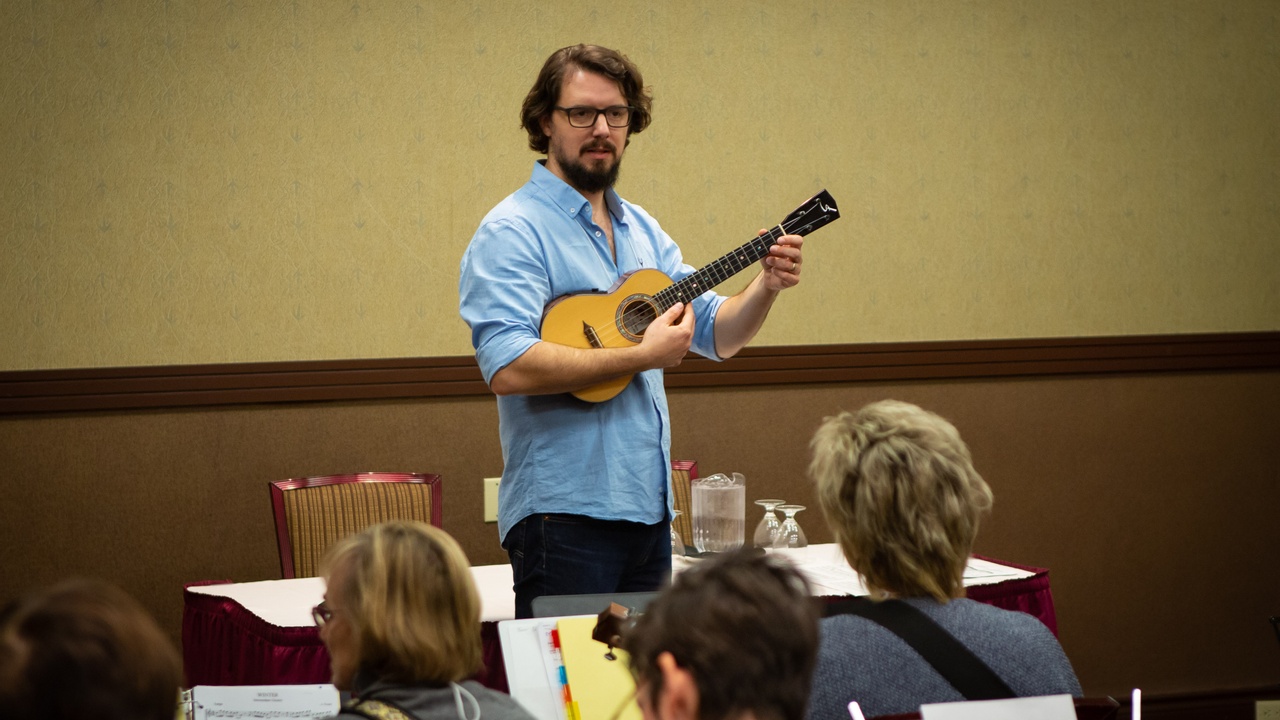What Makes a "Teachable" Song On The Ukulele

There's a difference between "a good song" and "a good song for teaching music." This month's From the Vault features our very own James Hill exploring what it means for a song to be "teachable," concluding that when it comes to choosing repertoire, you can have your cake and eat it too!
From Ukulele Yes! March 2011 (online)
In the Spring 2009 issue of Ukulele Yes! I made a case for teaching popular traditional songs in the classroom. Sensitive to the fact that many teachers want to teach "cool" popular songs (i.e. songs that are on their students' iPods), I suggested a handful of popular hits that are also traditional songs (e.g. Scarborough Fair, Sloop John B.). I then set out to find other songs to add to this list. The result is a new book of arrangements called Great Popular Songs, the first in a series of three volumes of supplementary repertoire for the Ukulele in the Classroom series.
As I worked on this new collection of arrangements I came up with criteria that each song had to fill in order to make the cut. These criteria were:
1. The song must have been recorded by great popular artists (so that students and teachers can hear inspiring – and contrasting – interpretations by their favourite performers).
2. The song must be in the public domain (so that no one has to worry about recording/performance rights).
3. I must like the song (I'll probably be teaching these songs for the rest of my life so this was an important consideration!).
4. The song must be "teachable."
It's this last point that I'd like to explore. What does "teachable" mean? What is a "teachable" song?
Perhaps the best way to define what I mean by "teachable" is to give an example of a song that falls short of being teachable in my view. Take The Banana Boat Song ("Day-O"). The Banana Boat Song has been recorded by popular artists (Harry Belafonte, the Muppets and others), is in the public domain, and has a rich history that connects to non-musical subjects like geography, economics and math. What's more, I personally like the song (especially the Muppets version).
In my view, however, it scores low on the "teachable" scale. Why? Because it's essentially a solo vocal feature. The best performances of this piece are delivered by a single (often charismatic) individual. In order to keep the spirit of the song intact, the performer must be free to infuse the song with his/her personal experience and to be somewhat whimsical with both tempo and phrasing. Sure, we could "iron out" the rhythms, notate every ornament and create a "choir" arrangement of The Banana Boat Song but I, for one, would rather scrub a chalkboard with steel wool.
By contrast, a song like The Cruel War (free arrangement available here), fills all four of the above criteria. It was a hit for Peter, Paul and Mary in 1966 and has been recorded by a number of other popular groups since. It's in the public domain and, with its civil-war-era story of separated lovers, can be related to extra-musical topics in social studies and literature. I personally love it's choral-like melody which is ideally suited to multi-part harmony singing.
In my view, the song is also very uke-friendly and "teachable." That is to say, it uses chords that are easily played on the ukulele, has straightforward rhythms and a melody with a very comfortable range for singing. This allows the teacher to focus on more advanced concepts like harmony singing and suspended chords.
Be discerning and purposeful in choosing repertoire for your students.
The lesson I learned from compiling and arranging Great Popular Songs is one that applies to all teachers: be discerning and purposeful in choosing repertoire for your students. The good news: while it may require a little research, it's possible to find songs that a) have rich stories rooted in cultural traditions, b) are enjoyable for the students, c) are enjoyable for the teacher, and d) lend themselves naturally to the ukulele and the classroom teaching context.
But don't just take my word for it; try a free sample from Great Popular Songs and decide for yourself.
Stay in the Uke Loop!
Subscribe to the Uketropolis Gazette. Free arrangements, tips, interviews and more delivered to your inbox.


